Example: I want to get all tag names that are inside field_tags of node 5.
I can get the target_id with $node->field_tags->getValue();
But the problem is, I don't know what entity the target_id value belongs to. Could be a node id, term id, user id. Without that info, I am not able to use the target_id to get the name of the tag.
How can I get all the names of an entity reference field?

